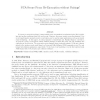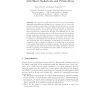123
click to vote
PKC
2009
Springer
15 years 6 months ago
2009
Springer
Abstract. Zero-knowledge proofs with witness elimination are protocols that enable a prover to demonstrate knowledge of a witness to the verifier that accepts the interaction prov...
142
Voted
PKC
2009
Springer
16 years 2 months ago
2009
Springer
ded abstract of this paper appears in PKC 2009, S. Jarecki, G. Tsudik (Eds.), volume 5443 of LNCS, pp. 357-376, Sringer-Verlag, 2009. CCA-Secure Proxy Re-Encryption without Pairing...
122
click to vote
PKC
2009
Springer
16 years 2 months ago
2009
Springer
We address the problem of polynomial time factoring RSA moduli N1 = p1q1 with the help of an oracle. As opposed to other approaches that require an oracle that explicitly outputs b...
133
click to vote
PKC
2009
Springer
16 years 2 months ago
2009
Springer
This paper describes new methods in pairing-based signature schemes for identifying the invalid digital signatures in a batch, after batch verification has failed. These methods ef...
117
click to vote
PKC
2009
Springer
16 years 2 months ago
2009
Springer
Recently, the new Multibase Non-Adjacent Form (mbNAF) method was introduced and shown to speed up the execution of the scalar multiplication with an efficient use of multiple bases...
115
click to vote
PKC
2009
Springer
16 years 2 months ago
2009
Springer
At Crypto'07, Goyal introduced the concept of Accountable Authority Identity-Based Encryption as a convenient tool to reduce the amount of trust in authorities in Identity-Bas...
118
click to vote
PKC
2009
Springer
16 years 2 months ago
2009
Springer
Abstract. Traitor tracing schemes are cryptographically secure broadcast methods that allow identification of conspirators: if a pirate key is generated by k traitors out of a stat...
119
click to vote
PKC
2009
Springer
16 years 2 months ago
2009
Springer
Similar to verifiable shuffling (or, mixing), we consider the problem of verifiable rotating (and random re-encrypting) a given list of homomorphic encryptions. The offset by which...
117
click to vote
PKC
2009
Springer
16 years 2 months ago
2009
Springer
TCHo is a public key encryption scheme based on a stream cipher component, which is particular suitable for low cost devices like RFIDs. In its basic version, TCHo offers no IND-CC...
114
click to vote
PKC
2009
Springer
16 years 2 months ago
2009
Springer
A key exchange protocol allows a set of parties to agree upon a secret session key over a public network. Two-party key exchange (2PKE) protocols have been rigorously analyzed unde...





